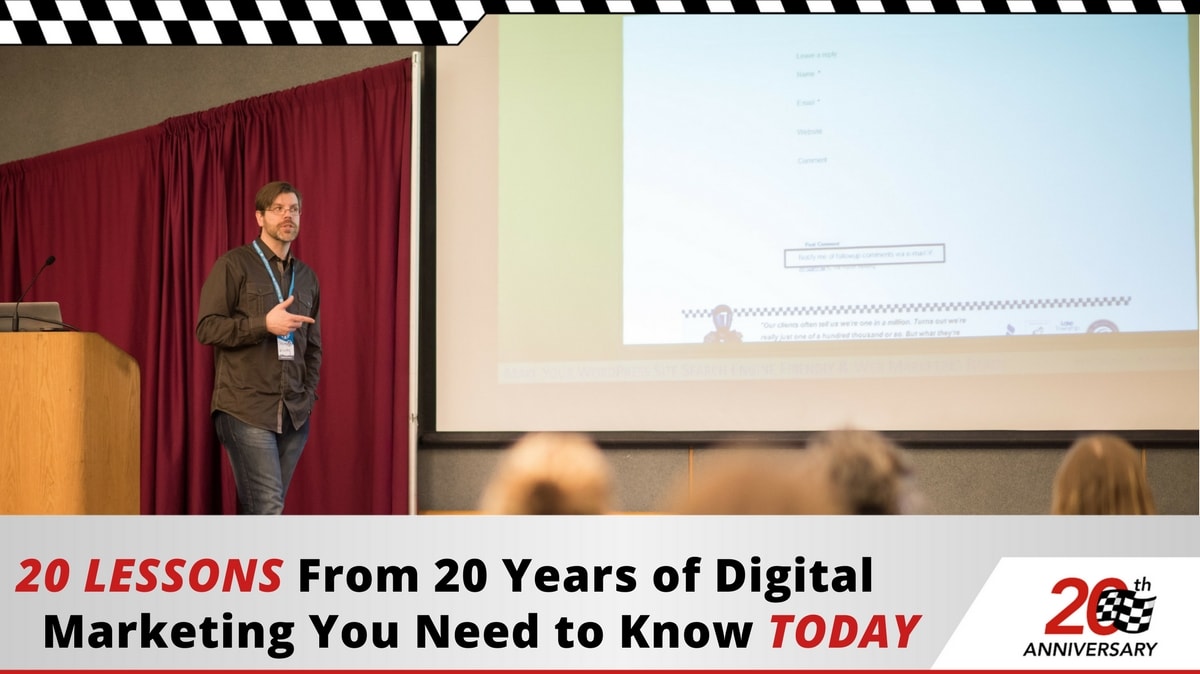
Twenty years is a long time! One of the great things about being a pioneer in the industry is having had the experience to learn things that are still taking the new generation of SEOs years to figure out.
I’ve learned a lot over the years, through both personal experience and the experiences of others. While I can’t necessarily say which education was more valuable, I can tell you which was less costly! And in light of that, I want to outline some of the lessons I’ve learned and pass those on to you.
The following are lessons every digital marketer and indeed every business leader needs to know today in order to succeed. Some are “old school” but no less relevant and important. And, as I have found out, even the obvious isn’t always obvious to everyone!
- It’s always about the visitor – Forget about tactics, strategy, and search engines for just a minute. Now, think about your customer. The person coming to your website to have a problem solved. Got them in your head? Okay, now, go ahead and think about the best way to make them happy.
- Temporary strategies lead to temporary results – Anything you do in the short term will likely lead to short-term results. While that’s fine in some situations, you want to make sure you’re looking at the big picture. Results that last are the most valuable.
- You can win with spam tactics until you lose big – Speaking of temporary wins, it’s unfortunate, but spammy strategies still work. If they didn’t, nobody would do them! But–and this is critical–they don’t work for long. You may win big gaming the system for a while, but you’re also going to lose big at some point.
- Good strategy doesn’t always speak for itself – This is another unfortunate side-effect of imperfect search engines. Just because you do everything right, doesn’t mean Google, or your audience, will take notice. Sometimes you have to go outside the box to get the attention you deserve. But when you do, all the energy you’ve invested will pay off.
- Algorithms (and people) will never be satisfied – You’re never going to have the perfect website. Ever. Because the moment that you do, something changes. People change, algorithms change, preferences change, desires change. You always need to be on the lookout for the next better way to reach your audience.
 “You’re never going to have the perfect website. Ever. Because the moment that you do, something changes.” — Stoney deGeyter
“You’re never going to have the perfect website. Ever. Because the moment that you do, something changes.” — Stoney deGeyter- Relationships matter – I don’t care how good your SEO is, you still have to build relationships. Both with your existing customers and your future audience. People want to support companies they have a personal connection with. Those relationships, while hard-fought, reap dividends down the road.
- Build one niche at a time – If you’re a visionary, it’s easy to bite off more than you can chew. But the risk can dilute your effectiveness. You’re usually best off dominating a single niche before you move into other areas. This can help you build a reputation for excellence. You can then leverage that reputation to bring in new business in new areas.
- Expectation building is critical – Managing the expectations of your customers is critical. Anytime someone’s expectations differ from reality, the disappointment can be substantial. And that often sours the relationship. Managing the relationship means managing the customer’s expectations.
- Stay in scope – It’s very easy to lose sight of the scope of work. This can lead clients to want and expect more and give you little opportunity to create upsell opportunities. If you manage scope properly you can keep everyone happy without losing your shirt.
- Never negotiate on price without negotiating on scope – Always be willing to negotiate, but never on price alone. A change in price comes with a change in scope. Otherwise, you’re just devaluing yourself and proving to the client that your assessments cannot be trusted.
- Never compete on price – There will always be someone that offers what you do at a cheaper cost. When you compete on price, you’re setting yourself up to lose for something you can’t control. Instead, compete on value. Can a competitor offer better value? Well, that’s entirely up to you.
- Become the indispensable expert – Trust is a key component to winning business. And no one does a better job of getting people’s trust than an industry expert. Is it you? Do you stand out? Do people rely on your advice? The moment you become indispensable, you have something people will have to pay for.
 “The moment you become indispensable, you have something people will have to pay for.” — Stoney deGeyter
“The moment you become indispensable, you have something people will have to pay for.” — Stoney deGeyter- Never give expertise away for free, for free – It’s the second “for free” there that’s the catch. To become the indispensable expert, you have to give away some expertise for free. But do it strategically. Every free piece of advice should lead your audience back to your services in some form or another.
- Perception often trumps reality – Numbers don’t lie, but people’s perception of what the numbers mean often do. You cannot win a numbers argument on the results if the customer doesn’t “feel” like the results are good. Which means you have to address your client’s perceptions. But always have the numbers to back it up.
- You can’t always get what you want – This is a song I sing to my kids all the time. It applies to businesses, too. You’ll never get everything just the way you want. Not your marketing, not the execution, and not the clients. Which means you have to get creative in finding new ways to achieve the best results possible.
- Don’t try to do everything yourself – Even if you work alone, never try to take on all the responsibilities on your own. That’s a case study for early burnout. Find people and/or vendors to fill the roles you’re not good at so you can focus on the things you are.
- Always hire people smarter than you – Never be afraid to have employees who know more than you. If you’re better at something than the person doing the job, then you should be doing it, not them (except for a brief season of training.) You’re where you are for an entirely different set of skills. Master those and let the people who work for you master theirs.
- A happy team makes for happy clients – Nobody is an island. We rely on the skills and experience of other people to help us succeed. One of the best ways to keep clients happy is to keep the people working for you happy. When people aren’t happy, they cut corners. Happy people give a little extra.
- Find a balance between micromanaging and macromanaging your team – No one likes a micromanager, but we all know that teams do need to have management pushing them to do their very best. Micromanagement leads to employee burnout and macromanagement leads to unhappy clients. Find the balance so everyone excels.
- Don’t promise the world and only deliver the moon – This goes back to expectations but takes it a step further. It’s better to set expectations lower than you can deliver and then give them far more than they ask. This is especially true when it comes to results. If you overpromise, you’re defeating yourself in the expectation game.

One Response to 20 Lessons from 20 Years of Digital Marketing You Need to Know Today